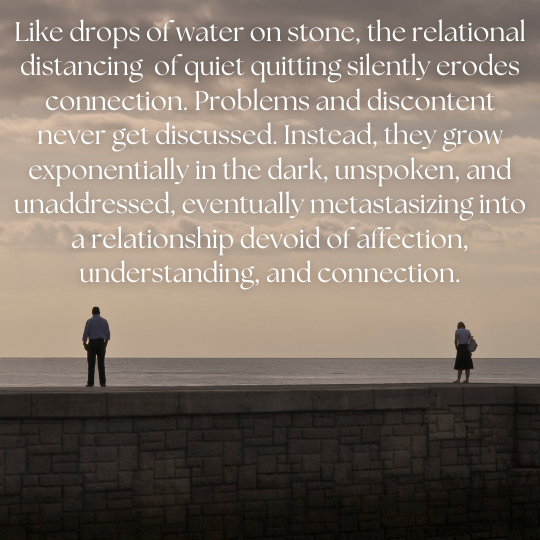Everywhere you look online, you see mentions of quiet quitting.
This slow cooker of disengagement is nothing new; it's a common way to subtly yet deliberately disconnect from jobs and relationships.
Quiet quitting is a defense mechanism that protects us when we feel threatened, disconnected, or unappreciated. This emotional armor is a go-to for those who feel powerless or have too much at stake to stand up for themselves and walk away.
Consistently not being acknowledged at work for your contributions? Why would you work hard, pouring your creativity into projects when your dedication and innovation aren’t being recognized? It's easier to dial down your commitment, doing the bare minimum to keep your job and avoid confrontation.
The same happens in romantic relationships.
Quiet quitting sets protective boundaries by compartmentalizing one partner from the other. Emotional, mental, and physical walls of indifference are erected, eliminating open and honest communication and physical and emotional intimacy.
Like drops of water on stone, this relational distancing silently erodes connection. Problems and discontent never get discussed. Instead, they grow exponentially in the dark, unspoken, and unaddressed, eventually metastasizing into a relationship devoid of affection, understanding, and connection.
Individuals quietly quit for many reasons.
Some may have seen this modeled in formative relationships growing up. Others may not possess the psychological or physical safety to advocate for themselves or, as a rule, do everything in their power to avoid conflict. And some people fear what they might lose by bringing issues to light - are they solvable? Will your partner care enough to work on the relationship? What happens if it isn't working?
I've quietly quit past relationships because:
1) I was afraid my partner would talk me into staying
2) I was afraid of verbal abuse and/or physical violence(*)
3) I felt the relationship was past the point of no return, and I didn't want to try to resurrect it
4) I didn't have the courage to face the issues head-on and express them out loud to my partner
Pulling away can feel safer than stirring the relationship pot. Like young children afraid of the dark, we'd rather hide under the covers than chance looking beneath the bed for the lurking monster. Quiet quitting enables us to intentionally divorce ourselves from drama and overwhelm, ultimately separating our identity from our relationship without actually dissolving the partnership.
The signals of quiet quitting include distance, detachment, and avoidance.
Distance: Both physical and emotional, individuals backstepping away from their relationships create space from their partner. They stop putting effort into the relationship, and, where connectedness once thrived, indifference begins to flourish. Communication languishes, problems go unaddressed, and the overall energy is awkward, tense, and painfully surface level.
Detachment: Emotional connection is a cornerstone of a solid, healthy relationship that creates a deep bond of trust. This bond begins to erode when one person intentionally withdraws. With emotional connection comes intimacy; a lack of intimacy leaves an emotional and physical vacuum in which trust and vulnerability deteriorate.
Avoidance: Quiet quitters do not want to spend time with their mate, one-on-one, or with others. They have no desire to spend time with their partner and will find many ways to busy themselves that purposefully create an exclusionary environment.
You may see signs of this in your relationship, either with yourself or your partner. But as with everything, ignoring or hiding from problems doesn't make them disappear.
Having been a Quiet Quitter, I don't recommend "the quiet exit or escape," as both partners must live with years of unresolved issues, what ifs, regrets, and constantly asking, "what did I do to deserve this?" This can (and most likely will) follow you into future relationships and may lead to a pattern of quiet quitting versus open communication.
Facing issues head-on may be uncomfortable, but it's the only way we - and our partner - can move on, either together or separately. It is always best to address relationship issues as they arise. If you and your partner find your problems are insurmountable, civilly discuss the best way to safely and amicably go your separate ways.
Realize that raising this issue may cause friction. Quiet quitting is about keeping the peace and avoiding unpleasantness by downgrading a relationship through detachment and indifference. Talking about it doesn't create the issue; it just shines a light on what's been lurking unspoken and unaddressed.
The first step is to be certain of the situation. Take time to understand how you honestly feel about your relationship and if it's worth fighting for. If you've been stepping back, ask yourself why and if you believe those relational fissures can be repaired with open, honest communication.
If you believe your mate has been the one disconnecting, reflect on how that's been happening and when you first noticed the distancing. Are there situations you can pinpoint that may have been the catalyst?
Communicating with your partner is the next step. Consider what you want to say and how to say it in a kind, non-threatening manner.
If you've been the one quietly quitting, be candid about why and how. If you feel your mate has been making a silent exit, express how you've noticed this and ask if they're willing to discuss how they've been feeling.
Actively listening without judgment and defensiveness will be challenging but is crucial to bridging the gap in your relationship. Try to set aside expectations and strive instead for truth, compassion, and understanding, whatever the outcome.
(*)If you don't feel physically or emotionally safe in your relationship, and are fearful of retribution or violence, I encourage you to do what is necessary to keep yourself from harm.
